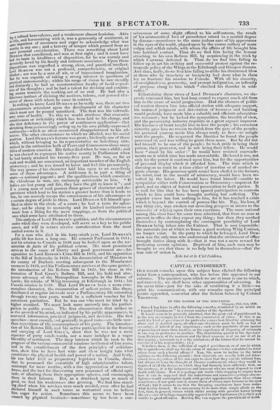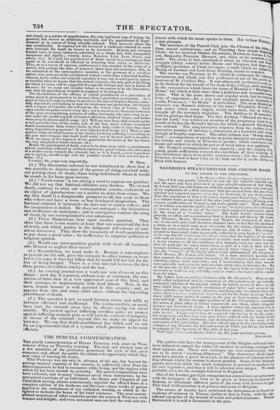CAPITAL PUNISHMENT.
Oen recent remarks upon this subject have elicited the following letter from a correspondent, who has before this appeared in our columns. The question upon which we are at issue is one to which, unfbrtunately, we shall have other opportunities of adverting. In the mean time—just for the sake of ventilating it a little—we print his communication, with our remarks upon the principal points appended, somewhat after the fashion beloved by Colonel Tnoat esoN.
TO' THE EDITOR OF TIIE SPECTATOII.
Glasgow, 20th July 1840. Stit—I beg leave to offer the following remarks, occasioned by an article on " Capital Punishment " in a recent number of the Spect,dor. It would seem to he generally admitted, that the great end of punishment is, in the way of example, to deter from the commission of crime. If this is so, until the Is m mmml of punishment for particular climes best fitted for attaining the above end is decideit upon, all other considerations must be held as but of secondary, if indeed of any importance; such as the popularity of one species of punishment more than another, or the expediency of disposing of criminals ill lIlle l■ ay in preference to another. The illustration, quoted in the Spectator from 1iLNTII AM, of the mailman and the hired assassin, is of no use at all in this inquiry. ; inasmuch as it is time misfortune of the former that he cannot be convinced id his responsibility. ( I.) 'Whether, then, is the infliction of capital punishment, or of one in which life is spared—we shall say for the crime of murder—better calculated to deter others from such a horrid offence ? You, Sir, seem to incline to the latter opinion, on the tidlowing grounds : that criminals are usually bold and deter- mined mm mm, reganlIc.,s of We mid eager to show that they can die without fear, but abhorrent I. oin the thought of irksome confinement, where they would be deprived of all the licence to which they had formerly been addicted; that, on Slit contrary, it is the industrious and innocent who are most disposed to view death n it li alarm. Now it is perhaps not worth while stopping to inquire here bow it can be sopposed that the industrious and innocent—perhaps also re- ligious—would contemplate death with greater apprehension than those whose ctmscienees, if nor quite seared, accuse them of crimes most heinous in the eyes of Cod; hut it seems to me that the foregoing conclusions have been some- what hastily formed. It is unnecessary to do more than simply allude to the fact, that, in general, crimes which strike society with peculiar horror. betray the 4:xis:owe of feelings remarkably opposed to that fearlessness (2.) which you ascribe to great offenders. Besides, Sir, you suppose the punishment of death not simply as a matter of apprehension, the only legitimate way of trying the question, but viewed as absolutely inevitable, and the punishment of impri- sonment as in course of being actually endured. This, however, alters the case considerably. It requires not the nerves of a hardened criminal to meet with fortitude the death he knows to be inevitable. Delicate and virtuous females have, in many instances, submitted to a bloody fate with unequalled composure and dignity ; witness ANNA BOLEYN, Lady JANE GRE`V, and others. (a) It is only the punishment of death viewed as a contingency that ought to he considered as effectual in deterring from crime, or otherwise. Then, as to a course of rigorous confinement being awarded to the crime of a wretch with perhaps the stain of innocent blood upon his conscience, this, in the estimation of the contemplative moralist, or the possessor of a sensitive nature, may seem an awful punishment indeed—worse than a hundred deaths; whereas, tonic sullen and unsocial reprobate it may not, in anticipation, appear so dreadful when he knows that his animal existence. the only part of his being for which he cares, will be supported through lift without arty care or labour of his own ; for we must not consider labour or starvation to be the alternative, now that the punishment of death is supposed to be abrogated.
The disclamation of the efficacy of capital punishment as a preventive of crime, must be pronounced to he no more than a gratuitous assumption. As a proof of this, it is only necessary to advert to the case of helpless females, natu- rally dependent, and looking to man for tenderness and protection, but treated with a degree of brutality not inflicted on the lowest class of brutes. Such cases crowd our police-courts every day ; not to mention the thousand instances of the poor uncomplaining partners of leant husbands, who pine away iii se- cret under the double anguish of crushed affections, blightol hopes, and bodies worn away by disease and ill-usage. (4.) Will any man deny, that were it not for a well-grounded fear of the strong arm of the law, many callous scoundrels would consummate those crimes s%hich, by their daily condo t they thus show every disposition to perpetrate ? It were indeed a bold denial. (5.) There is also another crime of which woman is the victim, involving suffering so revolting to the pure and virtuous, that death itself would not be deemed half so dreadful. With too many of the depraved of our population the term et the law forms the only safeguard to female honour. (6.)
Before the punishment of death comes to be done away with—a punishment almost uniformly inflicted by civilized nations far great crimes—the advocates of a milder course towards the criminal, but, as it is feured, a more hazardous one to society, should weigh well the probable results of their untried specu- lation. (7.) 1 remit), Sir, yours very respectfully, W. MILL.
(1.) The illustration referred to was introduced to show that it was possible to deprive men of the power of doing mischief with- out putting them to death, there being individuals whom it would be unsafe to let loose upon society. (2.) " Fearlessness" is too strong a word to express our position. We did not say that habitual offenders were fearless. We viewed death, contrary to what our correspondent asserts, exclusively as an object of apprehension—as a motive to deter front crime. We say that death is a disagreeable prospect to all, but most to those who reflect and have a more or less developed imagination. The habitual criminal is iinbruted—he does not or cannot reflect ; and his imagination is dulled. Ile does not anticipate; the industrious and inoffensive do anticipate ; and in anticipation consists the sting of death, by our correspondent's own admission. (3.) These illustrations bear upon another question. They show that there is one motive at least that can countervail the fear of death, and which motive is the indignant sell-esteem of con- scious innocence. They show the incapacity of death-punishment to put down a good cause ; its inefficiency to suppress political or religious opinion.
(4). Would our correspondent punish with death all husbands who ill-treat or neglect their wives?
(5.) Nevertheless, we must make it. Because a man neglects to provide for his wife, gives his company to other women, or beats her in his cups, it does not follow that he would kill her but for the fear of' being hanged. There is a wide interval between the first three grades of reckless cruelty and the last.
(6.) An evening journal was a week ago very eloquent on this theme : next day it reported, without note or comment, the con- viction of three men in a very aggravated case of this kind, and their sentence to imprisonment with hard labour. Now, in the main, female honour is well guarded in this country ; and, as appears from this and many other eases, without the impending punishment of death.
(7.) The question is not so much between severe and mild, as between effectual and ineffectual. The sentimentalists, as usual, have hurt the rational cause here by always crying out about cruelty. We protest against inflicting needless pain ; we protest against inflicting so much pain as will turn the current of sympathy in favour of the criminal ; beyond this we make no appeal for leniency. We say that death-punishment has tidied, and we ask for an experimental trial of a system which promises to be more efficient.



























 Previous page
Previous page